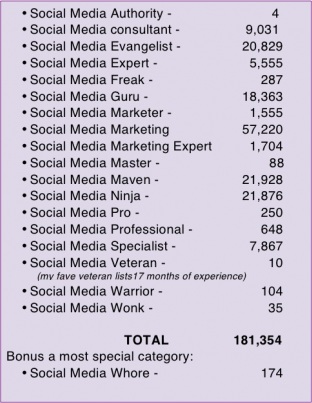A recent study by AdAge, which has been tracking such things since 2009, shows that there are over 180,000 people on Twitter who claim to be social media mavens, experts, consultants, ninjas, pros, warriors, or some other noun that’s intended to fill you with confidence about their ability to save you from the evil world of Facebook, Twitter, and Google+. This is up from 16k when they first checked.
It’s challenging for businesses to keep up. The world of social media offers so much potential, so many options, and has so many people using it every day that the allure to get involved is high, but there are risks. Bad strategies, an inability to keep up with changes, and the potential to blow a lot of time and/or effort are all high. Businesses often look to experts who reside in this world on a constant basis to guide them through the mess.
The bad part is that the industry can be an extremely lucrative one, so many people are jumping in without having a true understanding of how to make it work for business. The good part is that there are things you can do to identify the good ones from the bad, the real ones from the posers. Here are some telling signs:
Check their personal accounts
 The most important component here is that follower counts mean nothing. For under $100 a Twitter user can buy thousands of “followers”. Given enough time and a willingness to accept any friend requests, a Facebook account can hit the 5,000 “friend” limit in a couple of months.
The most important component here is that follower counts mean nothing. For under $100 a Twitter user can buy thousands of “followers”. Given enough time and a willingness to accept any friend requests, a Facebook account can hit the 5,000 “friend” limit in a couple of months.
You’ll be looking at two things when checking the accounts. Links – what kind are they posting? Are they posting links to notoriously spammy sites like Hubpages and Squidoo? Do the links lead to teeth whitening, Forex, or “how to make money from home” ebooks? Everyone has to start somewhere, but those who are worth their title should have gone beyond the spamming and moved into the realm of quality content posting, particularly with their personal social media accounts.
The second thing you’ll look for is interaction. Are people retweeting them? Talking to them? Engaging with them? Commenting, liking, and sharing their content on Facebook? Giving their posts +1s on Google+? If so, is it organic? Just as with the account size factor, it’s not hard to buy likes and retweets. Are the people engaging with them real people or fake?
Look at their advice, strategies, and tips
Most gurus have a blog. They may have a YouTube channel. They should be on Pinterest. Check out the content that they’re posting and the advice that they’re giving. While not every guru is a writer, it’s safe to say that they should be able to put together a list of tips at the very least.
Are they putting out advice videos? These don’t have to be regular – a video with the right content can be useful for months – but there should be something of interest, some rants or recommendations that work on video. Are they pinning quality infographics on Pinterest?
Content is a tool of the trade. If they aren’t putting out content on their own sites or social profiles, do they really know what they’re doing or are they regurgitating strategies they read on Mashable and Social Media Today?
Look at their clients
As with any agency or individual that you hire, it’s important to look at the results of their efforts. Check to see if the pages they run, the accounts that they manage, and the content that they’re posting is effective.
Again, size doesn’t matter here. It would be easy for me to say, “don’t work with people who only have a couple of clients” since my company is loaded with clients, but it’s simply not true. Some of the brightest minds and most effective social media experts that I know only keep a handful of clients. Size is not important. If anything, being too large means that your needs won’t get the personal touch that you might require.
The most important component here is to call or email the clients. Be very skeptical about experts who use the “client confidentiality” ploy. It’s true, there are times when businesses do not want it known that they use a social media agency, but that really only applies to being out in public. I’ve had clients that do not want us to post that we work with them on our website, but none of them in the last 5 years have ever said they were unwilling to be a reference to a potential client. If they’re unwilling to let you contact their clients, they might not have any.
Social media isn’t hard. It’s time-consuming. It requires a constant attachment to the changes that are happening. That’s the main reason to hire gurus, experts, and agencies – if you’re running a business, do you have the time and energy to devote a couple of hours a day keeping up with it all? Finding the right person or agency isn’t hard, either. Yes, it requires an investment of time to find and check out candidates, but that is time well spent. It’s better to have no strategy or presence than a bad strategy driving a poor presence.




A quick and easy tactic to tell if the guru site is spot on or out of left field • hover over their +1 digg digg widget • if they don’t have a min. of 3 posts w/ 10+ recommended articles • chances are they less guru and more other
I’m seeing more of these popping up following me on Twitter and sending me Direct Messages as well.